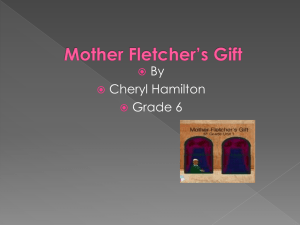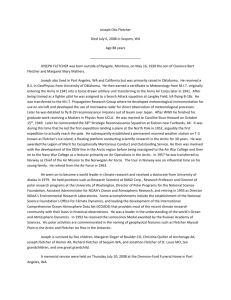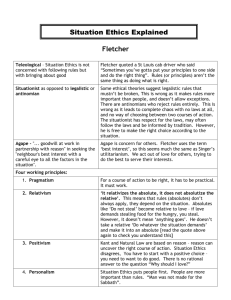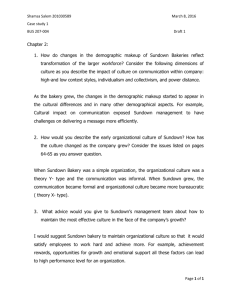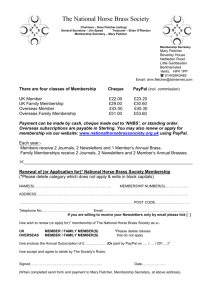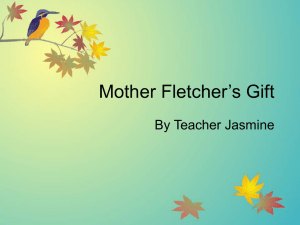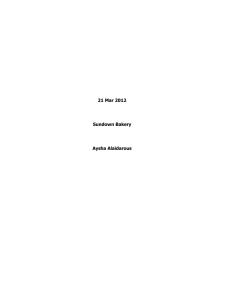brief synopsis of american cowboys
advertisement
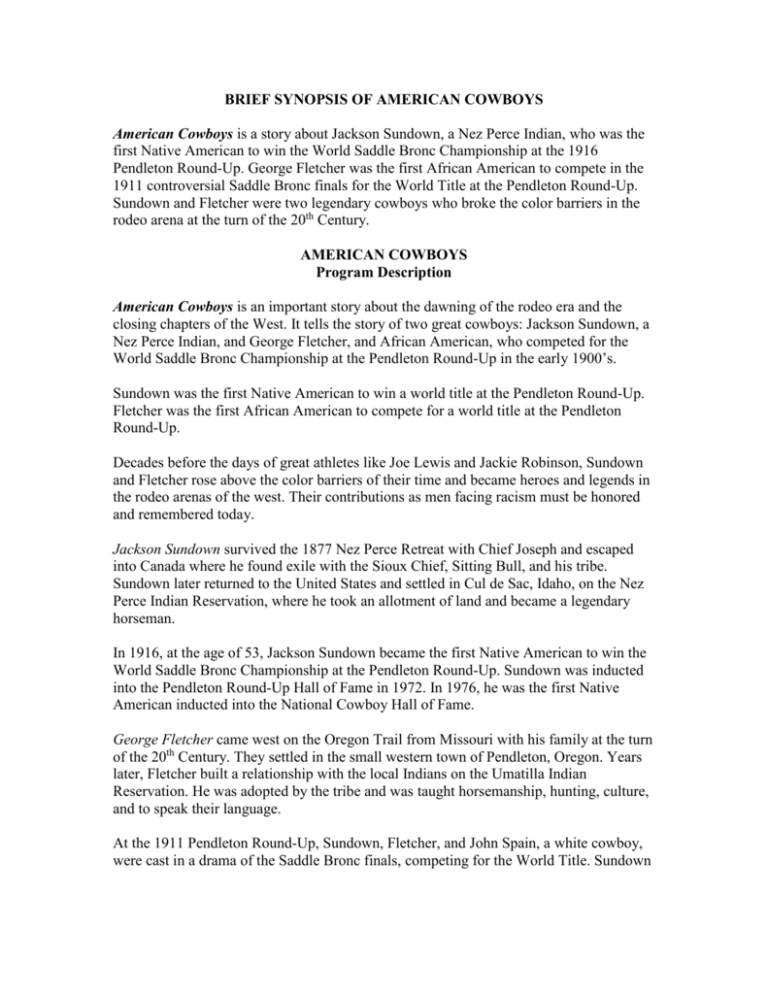
BRIEF SYNOPSIS OF AMERICAN COWBOYS American Cowboys is a story about Jackson Sundown, a Nez Perce Indian, who was the first Native American to win the World Saddle Bronc Championship at the 1916 Pendleton Round-Up. George Fletcher was the first African American to compete in the 1911 controversial Saddle Bronc finals for the World Title at the Pendleton Round-Up. Sundown and Fletcher were two legendary cowboys who broke the color barriers in the rodeo arena at the turn of the 20th Century. AMERICAN COWBOYS Program Description American Cowboys is an important story about the dawning of the rodeo era and the closing chapters of the West. It tells the story of two great cowboys: Jackson Sundown, a Nez Perce Indian, and George Fletcher, and African American, who competed for the World Saddle Bronc Championship at the Pendleton Round-Up in the early 1900’s. Sundown was the first Native American to win a world title at the Pendleton Round-Up. Fletcher was the first African American to compete for a world title at the Pendleton Round-Up. Decades before the days of great athletes like Joe Lewis and Jackie Robinson, Sundown and Fletcher rose above the color barriers of their time and became heroes and legends in the rodeo arenas of the west. Their contributions as men facing racism must be honored and remembered today. Jackson Sundown survived the 1877 Nez Perce Retreat with Chief Joseph and escaped into Canada where he found exile with the Sioux Chief, Sitting Bull, and his tribe. Sundown later returned to the United States and settled in Cul de Sac, Idaho, on the Nez Perce Indian Reservation, where he took an allotment of land and became a legendary horseman. In 1916, at the age of 53, Jackson Sundown became the first Native American to win the World Saddle Bronc Championship at the Pendleton Round-Up. Sundown was inducted into the Pendleton Round-Up Hall of Fame in 1972. In 1976, he was the first Native American inducted into the National Cowboy Hall of Fame. George Fletcher came west on the Oregon Trail from Missouri with his family at the turn of the 20th Century. They settled in the small western town of Pendleton, Oregon. Years later, Fletcher built a relationship with the local Indians on the Umatilla Indian Reservation. He was adopted by the tribe and was taught horsemanship, hunting, culture, and to speak their language. At the 1911 Pendleton Round-Up, Sundown, Fletcher, and John Spain, a white cowboy, were cast in a drama of the Saddle Bronc finals, competing for the World Title. Sundown was the first to ride in the finals. His horse bumped into one of the judge’s horses and he was dismounted, losing his chance for the title. John Spain rode second. He made a good ride, but there was a claim of a foul, that he had touched the horse with his free hand. The judges scored his ride despite the protest of the crowd. Fletcher was the last to compete. He made an outstanding ride and brought the cheering audience to its feet. But the judges failed to score him on his ride. Instead, the judges forced Fletcher to ride a second time, in the hope that he would be bucked off. The crowd grew restless as Fletcher mounted up. The horse bucked wildly with Fletcher, and the crowd roared its approval. His ride completed, Fletcher dismounted, looking at the judges and the cheering crowd, the judges announced, “Spain first, Fletcher second, and Sundown third.” The judges declined to award the African American cowboy his well-deserved World Saddle Bronc Championship. The dissatisfied audience stampeded the arena and crowded around George Fletcher. Sheriff Til Taylor took Fletcher’s hat, tore it into pieces, and sold the pieces to the crowd. The Sheriff then awarded the money to Fletcher, and honored him as the People’s Champion. After 1911, Fletcher only made exhibition rides because no cowboy wanted to compete against his incredible horsemanship. In October of 2001, George Fletcher was inducted into the National Cowboy Hall of Fame. Jackson Sundown was inducted into the National Cowboy Hall of Fame in 1976 and is the only Native American inducted to date. Jackson Sundown, a Native American, and George Fletcher, an African American, broke the color barriers in the rodeo arena at the turn of the 20th Century. Their story is one of hope and courage. KEY PERSONNEL SUMMARY CEDRIC WILDBILL AND TANIA WILDBILL Owners and Partners Wildbill Productions, LLC PERSONAL BIOGRAPHIES Cedric Wildbill is an enrolled tribal member of the Confederated Tribes of the Umatilla Indian Reservation. Together with his wife, Tania, he is the writer, producer, and director of the award winning documentary, American Cowboys. The show was produced in association with Oregon Public Broadcasting, and Native American Public Telecommunications and was narrated by William Hurt, Academy Award Winner. American Cowboys won Best Documentary Made for Public Television at the 1999 Great Plain Film Festival in Lincoln, Nebraska. In April of 2001 American Cowboys won Best Documentary at the New York International Independent Film and Video Festival. A recent PBS Carriage Report, shows the documentary still running consistently (since November of 2001) on PBS affiliates across the United States. Mr. Wildbill graduated from Mt. Hood Community College with an Associate Degree in Television Production Technology. He has worked at Boeing as a Media Specialist and is the Marketing Director for the Pendleton Yoga Round Up, LLC. Tania Wildbill, along with her husband, Cedric, was the writer, producer, and director of the award winning documentary, American Cowboys. Mrs. Wildbill was also the videographer on the documentary. Wildbill graduated with a Master of Science degree in Journalism from Columbia University in New York City in 1995. Wildbill was a producer, reporter, and anchor with the Texas Associated Press Network. She also studied literature at the Sorbonne University in Paris, France and with the Institute of European Studies. American Cowboys won Best Documentary Made for Public Television at the 1999 Great Plain Film Festival in Lincoln, Nebraska. In April of 2001 American Cowboys won Best Documentary at the New York International Independent Film and Video Festival. A recent PBS Carriage Report, shows the documentary still running consistently (since November of 2001) on PBS affiliates across the United States. Wildbill moved to the Umatilla Indian Reservation to marry Cedric. She worked as a Production Coordinator for TCI Media Services. Later she worked as a Public Relations Specialist for Bethphage. Then as a Special Projects Coordinator for Umatilla-Morrow ESD. She returned for 16 months to Bethphage to work as a Vocational Coordinator serving individuals with Developmental Disabilities. Mrs. Wildbill worked as a Substitute teacher for the Pendleton School District. Today she is the Education Grant Writer for the Confederated Tribes of the Umatilla Indian Reservation and has been the co-owner and partner of Wildbill Productions, LLC, since 1996. Mrs. Wildbill is the Co Founder and Director of The Yoga Round Up, LLC, which was founded in 2009.

